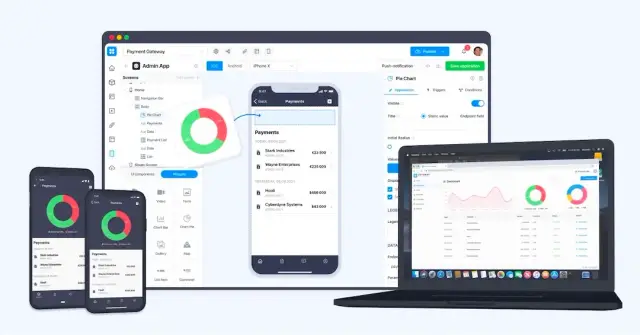Legal Compliance for No-Code Agencies: What You Need to Know
Understand the importance of legal compliance for no-code agencies and learn how to navigate the complex regulatory environment to avoid potential challenges and risks.

As the no-code movement continues to gain momentum and empower countless businesses and individuals to create digital solutions without traditional coding skills, it is essential for agencies providing no-code services to understand and comply with the complex legal environment. Legal compliance for no-code agencies ensures that the applications and solutions they build meet the necessary legal standards, adhere to industry best practices, and protect both their clients and users.
Navigating the world of legal compliance can be challenging. Still, by understanding key aspects such as data protection and privacy regulations, accessibility and usability compliance, intellectual property rights, security, and the unique challenges faced within the no-code space, agencies can reduce non-compliance risks and build trustworthy, high-quality solutions.
Data Protection and Privacy Regulations
In today's increasingly connected world, where vast amounts of personal and sensitive data are processed daily, data protection and privacy are paramount. No-code agencies, like every other business that processes personal data, are subject to data protection and privacy regulations that require strict adherence. Some major regulations that agencies need to be aware of include:
- General Data Protection Regulation (GDPR): Enacted by the European Union, GDPR has a global impact and applies to any organization that deals with the personal data of EU residents, regardless of the company's location. Ensuring GDPR compliance is a critical aspect of legal compliance for no-code agencies operating in or serving clients in the EU.
- California Consumer Privacy Act (CCPA): A significant piece of privacy legislation in the United States, the CCPA applies to businesses operating in California and dealing with customer data. No-code agencies serving clients based in California must ensure their services meet CCPA requirements.
To ensure you comply with data protection and privacy regulations, consider taking the following steps:
- Understand the relevant laws: Familiarize yourself with the regulations most applicable to your business, such as GDPR or CCPA, and ensure full compliance with their provisions.
- Secure data storage and transmission: Store customer and user data in secure, encrypted formats and maintain secure channels for data transmission to prevent unauthorized access.
- User consent: Ensure users have given their informed consent to data collection, processing, and transfer, when required.
- Privacy policies: Develop and publish clear and transparent privacy policies that outline how user data is collected, stored, and processed, along with their rights concerning their data.
Accessibility and Usability Compliance
Digital accessibility and usability are essential elements of legal compliance for no-code agencies. Accessibility compliance ensures that digital solutions and services are accessible to individuals with disabilities, enabling them to interact fully with and use the software. No-code agencies must be aware of established guidelines and regulations such as:
- Web Content Accessibility Guidelines (WCAG) 2.0 or 2.1: These are a set of recommendations and best practices developed by the World Wide Web Consortium (W3C) to ensure website content is accessible to all users, including those with disabilities.
- Section 508 of the US Rehabilitation Act: Aimed at making electronic and information technology accessible to individuals with disabilities, this regulation particularly applies to federal agencies and organizations receiving federal funding.
To ensure accessibility and usability compliance, consider the following steps in your no-code solutions:
- Adhere to established guidelines: Follow the WCAG 2.0 or 2.1 and Section 508 standards when developing digital solutions, and incorporate accessible design principles throughout development.
- Test for accessibility: Perform continuous and rigorous testing of your digital solutions to identify and rectify any accessibility issues.
- Ensure compatibility with assistive technologies: Make sure your applications and websites work seamlessly with assistive technologies such as screen readers, text-to-speech software, and voice recognition systems.
- Provide multiple ways to access content and features: Design your solutions to accommodate various interaction modes and preferences to give users the flexibility to navigate and interact with your application in a way that suits them best.
Understanding and incorporating these compliance aspects in your no-code development process can create inclusive and legally compliant digital solutions for your clients and users.
Intellectual Property Rights and Licensing
Intellectual property (IP) rights are crucial to any business, and no-code agencies are no exception. To maintain legal compliance and protect their clients, no-code agencies must pay close attention to IP rights, including copyrights, patents, trademarks, and software licenses associated with third-party components in their solutions.
Understanding Intellectual Property Rights
Intellectual property rights protect the creations of individuals or organizations under the law through copyrights, patents, and trademarks. In the context of no-code agencies, IP rights should be considered in the following areas:
- Source code: Even though no-code development avoids writing code manually, the resulting applications still contain source code generated by the no-code platform. When you create an application using a no-code solution, it's essential to identify who owns the rights to the generated source code.
- Design and content: In addition to the code, the designs, graphics, and text content of an application may also be subject to IP protection. No-code agencies need to ensure that they have the rights to use such assets in their applications or offer them as part of their services.
- Branding: Logos, product names, and other branding elements may be subject to trademark protection. No-code agencies must respect existing trademarks and protect their brands from infringement.

Managing Software Licenses in No-Code Solutions
No-code agencies often depend on third-party components, tools, and libraries to provide specific application functionality. These components can be subject to various licensing schemes, ranging from permissive open-source licenses to restrictive commercial licenses.
No-code agencies should understand the terms and conditions of the licenses associated with third-party components used in their solutions to ensure legal compliance. This may include:
- Verifying that they have obtained the necessary licenses to use and distribute any proprietary component.
- Complying with the requirements of open-source licenses, such as attribution and sharing the source code under certain circumstances.
- Obtaining the proper rights to use and modify any third-party assets, such as images or fonts, incorporated into their applications.
Understanding IP rights, licensing, and respecting existing regulations, can protect no-code agencies from the risks and legal challenges associated with potential IP infringement and create a safe environment for developing innovative applications.
Security and GDPR Compliance
As no-code agencies increasingly deal with sensitive user data, they need to take data protection and privacy seriously. Among the most stringent data protection regulations is the GDPR.
Principles of GDPR Compliance
To comply with GDPR, no-code agencies must adhere to the following principles when handling personal data:
- Data minimization: Collect only the minimum amount of personal data necessary to fulfill the purpose of processing and avoid unnecessary collection and storage.
- Transparency: Inform users about the collection and processing of their personal data, including the purpose, legal basis, and duration of processing.
- Integrity and confidentiality: Ensure the security of personal data by implementing appropriate technical and organizational measures to protect against unauthorized access, accidental loss, and improper use.
- Privacy by design and by default: Incorporate privacy considerations into the design and configuration of systems, services, and applications from the outset.
Practical Steps to Ensure GDPR Compliance
No-code agencies should take the following steps to ensure GDPR compliance:
- Understand how the generated applications collect, process, and store personal data.
- Implement appropriate security measures, such as encryption and secure data storage, to safeguard personal data against unauthorized access or breach.
- Develop and maintain a comprehensive data protection policy outlining the agency's data protection and privacy approach.
- Ensure that data subjects can exercise their rights under GDPR, such as the right to access, rectify, or delete their personal data.
By adopting GDPR compliance, no-code agencies can minimize the risk of data breaches, maintain customer trust, and avoid hefty fines associated with non-compliance.
Telecommunications Regulations for No-Code Agencies
Some no-code agencies create applications providing telecommunication services, such as SMS, Voice over IP (VoIP), or other electronic communication services. These applications may be subject to national and international telecommunications regulations, impacting the legal compliance requirements for no-code agencies.
Understanding Telecommunications Regulations
Telecommunications regulations are a set of rules and standards that govern electronic communication services and providers. These regulations ensure quality, stability, and security of communication services and protect consumers and businesses from fraud and abusive practices.
In the United States, the Federal Communications Commission (FCC) is the primary regulatory body responsible for overseeing telecommunications services. Other countries have their respective regulatory bodies.
Ensuring Compliance with Telecommunications Regulations
To ensure compliance with relevant telecommunications regulations, no-code agencies should consider the following steps:
- Verify if the agency's services fall under the purview of telecommunications regulations by seeking legal advice or consulting with regulatory bodies.
- Understand and follow the requirements set forth by regulatory organizations, such as obtaining necessary licenses or permits and adhering to technical standards and consumer protection rules.
- Monitor regulatory developments and engage with industry groups to stay informed about changes in the regulatory environment and emerging trends in telecommunications.
- Implement best data protection and security practices to comply with privacy requirements and protect the integrity of their communication services.
No-Code Legal Compliance and AppMaster.io
AppMaster.io, a market-leading no-code platform, is designed to help users create secure, high-quality applications that adhere to legal compliance requirements. No-code agencies must choose a reliable partner like AppMaster.io to enhance their development processes and ensure regulatory compliance. AppMaster.io considers vital legal aspects, such as data protection and security. It enables users to create web, mobile, and backend applications through visual processes that follow industry best practices.
With AppMaster.io, you get a platform that keeps user data safe and respects data privacy, paving the way for compliance with regulations like GDPR or CCPA. The platform encourages developers to create accessible and usable applications by offering various components and templates that follow established accessibility guidelines. This makes it easier for no-code agencies to build solutions that comply with WCAG 2.0 or Section 508 standards.
Furthermore, AppMaster.io stays up-to-date with technological advancements and regulatory changes to ensure that your applications remain compliant even as the legal sphere evolves. The platform consistently receives updates, and its generated applications reflect the latest best practices for accessibility, data protection, and security.

In the context of telecommunications regulations, AppMaster.io can aid no-code agencies in building compliant solutions by providing a strong, flexible base to implement features such as SMS, VoIP, or other electronic communication services. By working within AppMaster.io's guidelines, agencies can create telecommunication solutions that adhere to local and international regulations without increasing the risk of non-compliance. Regarding intellectual property rights and licensing, AppMaster.io offers a transparent and well-defined legal framework for its users. This allows no-code agencies to create applications with a clear understanding of their obligations and rights, ensuring that they respect existing copyrights, trademarks, and patents.
Final Thoughts on No-Code Agency Legal Compliance
Legal compliance is crucial for no-code agencies operating in a world of ever-evolving regulations and technological advancements. Ensuring that your applications are built with compliance in mind can reduce the risk of substantial fines, loss of consumer trust, and damage to your reputation.
By partnering with a reliable no-code platform like AppMaster.io, no-code agencies can dramatically reduce the chances of non-compliance and focus on creating high-quality solutions for their customers. AppMaster.io offers a versatile and powerful environment that promotes accessible, secure, and legally compliant application development, helping no-code agencies confidently navigate the complex regulatory environment.
It is essential for no-code agencies to stay up-to-date with the latest regulations, best practices, security measures, and industry developments to avoid the pitfalls of non-compliance. As Bob Parsons, founder of GoDaddy, wisely said, "Anything that is measured and watched improves." By prioritizing legal compliance and leveraging platforms like AppMaster.io, no-code agencies can ensure that their applications are ready to face the demands of the modern digital world.
FAQ
Some key legal compliance aspects include data protection and privacy regulations, accessibility and usability compliance, intellectual property rights, licensing, security, GDPR compliance, and telecommunications regulations.
No-code agencies can ensure data protection and privacy compliance by understanding relevant laws like GDPR or CCPA, using encryption and secure data storage methods, and ensuring user consent to data collection and processing.
Accessibility and usability compliance ensures that software and digital services are usable by individuals with disabilities. No-code agencies must follow established guidelines, such as WCAG 2.0 or Section 508, to meet these requirements.
Intellectual property rights and licensing can have significant implications for no-code agencies, as they need to ensure that they have the right to use third-party components and software in their no-code solutions and respect existing copyrights, patents, and trademarks.
No-code agencies, particularly those handling and processing EU residents' data, need to be aware of GDPR and its key principles, such as privacy by design, data minimization, the right to erasure, and transparency.
Telecommunications regulations can impact no-code agencies if they offer solutions that involve SMS, VoIP, or other electronic communications services. Agencies need to understand and comply with applicable laws and regulations such as the FCC or other national regulatory agencies.
AppMaster.io, a powerful no-code platform, helps customers create secure and scalable applications while considering data protection and legal compliance aspects. AppMaster.io's framework and consistent updates ensure that applications built using the platform follow the latest regulatory requirements.
Non-compliance with legal regulations can lead to hefty fines, loss of customer trust, damage to reputation, and potential lawsuits. It is imperative for no-code agencies to understand and follow the legal landscape to reduce the risk of penalties and build products that their customers can trust and rely on.





